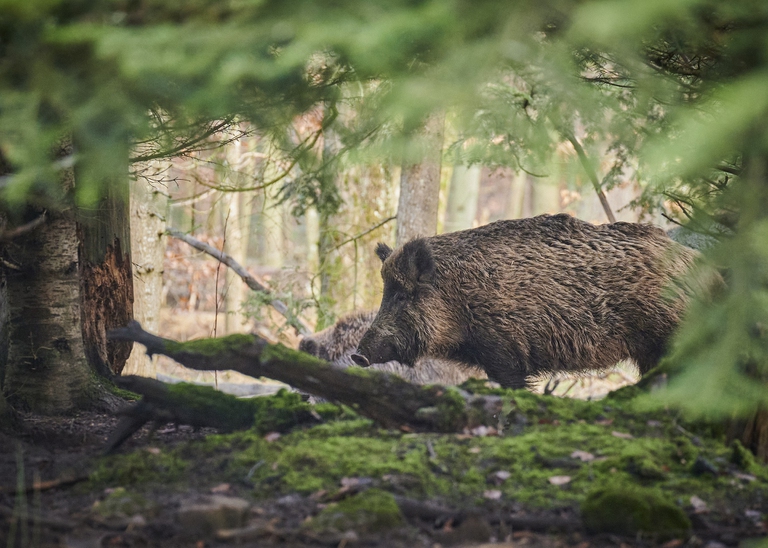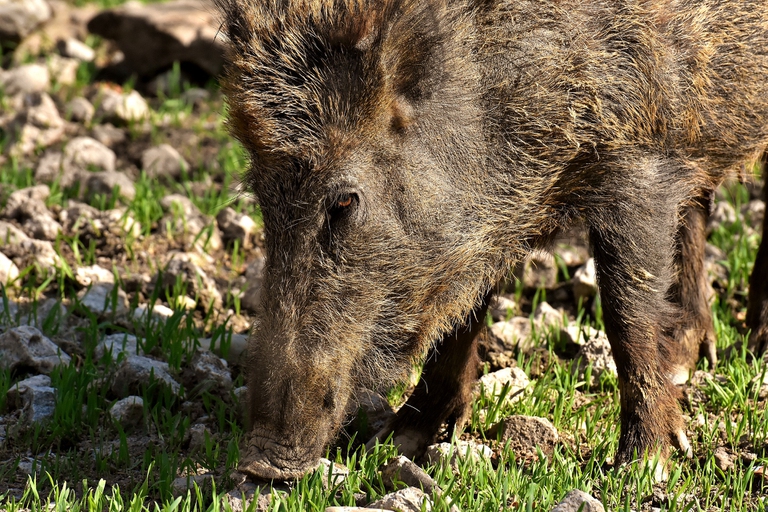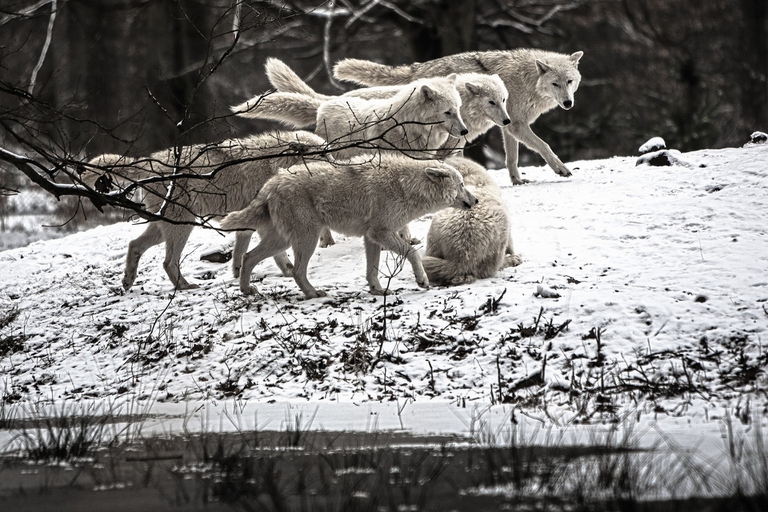https://www.lifegate.it/cinghiali-lupi-politica
- |
- Wild boars are now an unwelcome presence on Italian soil and Rome is not immune to their increasingly massive invasion.
- Political decisions weigh heavily on the situation and do not seem to show any glimmer of hope for management in Italy.
- In the meantime, attempts are also being made in Sweden to reduce the number of wolves in contravention of European directives on wild animals.
THE wild boars they invaded Rome.Regardless of amendments and positions taken by politicians and experts in recent days, even the splendid Villa Pamphili it was closed because some ungulates roamed undisturbed among the trees and bushes.And as if that wasn't enough, not long before a man on a scooter had ended up in a coma due to a close encounter with a wild boar.A red alert situation that is putting the nerves of the capital's citizens to the test, but which could have been both foreseen and contained if adequate measures had been taken in time.But the exponential increase in wild animals, wolves in the lead, seems to worry even the most civilized Sweden which plans - if it manages to obtain the necessary resolutions - to limit the number of these predators which, according to the Swedish authorities, are now too many on national soil.What's happening?We asked for the help of experts to try to draw guidelines that can help us understand.

Wild boars in Rome and throughout the peninsula
Recently the government introduced an amendment with the finance law which authorizes the containment of species deemed "dangerous" for agriculture, road traffic and public safety.This type of control is considered as an activity that does not coincide with hunting practice and therefore it was decided to consider it possible even in urban areas, in protected areas and without particular limitations, provided that these containment activities must always be carried out by equipped people Of hunting license and operate under the control of forestry carabinieri.The opinion on the measure is currently awaited Ministry of the Environment and Energy Security, also given that most of the directives, according to experts and animal rights associations, are to be considered illegitimate.
“The provision is terrible, both in terms of methods and an unacceptable vision which sees, as the only resolution of problems relating to fauna, theculling.And all this without worrying in the slightest about evaluating different ethically and scientifically more correct solutions", he clarifies in this regard Ermanno Giudici, writer and blogger.
“It must be said – he continues – that the amendment in question takes away the already scarce staff forestry carabinieri, invested with this further task which can be read as a desire to reduce their operational capabilities in combating crimes in the field of environment And biodiversity.However, maintain that this rule has authorized an uncontrolled urban far west, culminating with the episode of a hunter who shot a wild boar through a window and instead hit a car, is a fake that neither politics, in the media they should ride.In this way, misinformation is only created and it contributes to spreading the incorrect news that anyone can carry out killings, without rules".

Unfortunately, the basis of the problem of wild boars in urban areas is primarily the degradation increasingly evident in metropolitan areas invaded by waste of all kinds and bins that are not emptied regularly.All this induces wild animals – wild boars and foxes in the lead - to gradually invade the territory to obtain easy food within the pack's reach.
In this regard, the position of animal rights associations is clear as warned by a press release fromOipa, theInternational animal protection organization:“Hunting and selection policy are not the solution to the problem of wild boar proliferation, but they are the cause.All this is attested by ethologists, zoologists and naturalists.The presence of wild boars in the city is mainly due to incorrect waste collection.Furthermore, even further upstream, there is the politics of repopulations of past years.It is good to know that the ungulates that populate Italy today, larger and more prolific than native, were introduced by the countries ofEastern Europe for the use and consumption of hunters, who are now being used to solve a problem that they themselves have caused".
And speaking of the invasion of wild boars in Villa Pamphili, Alessandro Piacenza, wildlife manager of the animal rights association, adds that it is necessary, together with a metropolitan cleaning policy and correct waste collection, a correct use of deterrents – from chemical sterilization to targeted capture – already under study Ministry of Health.Oipa then requests that the captured wild boars be sent to specific structures and not killed, thus respecting Article 9 of the Constitution which also protects animals.
He who offends by nature perishes by nature, one might say.The phenomenon of wild animals becoming increasingly more confident towards humans has many causes and different aspects.However, all of them are based on the human inability to understand nature and relate to it.The decimation of wild boars, wolves and bears also causes a complex natural phenomenon.The females, if deprived of the alpha male, tend to mate with the remaining subjects, subverting and increasing the natural rhythm of heats, with the sole aim of generating new subjects that repopulate the herd.And the phenomenon therefore has the result of increasing the number of wild animals with a paradoxical and uncontrollable effect.

Wolves and Sweden, a political problem
The recent Swedish stance which provides for the demolition of 75 wolves on an estimated population of 460 specimens has raised quite a bit of controversy.And already the tug-of-war with the European Union promises to be long and complicated.The population of these predators, in Sweden and nearby Norway, had been almost extinct around 1970 as demonstrated by a study carried out by Ntnu, lNorwegian University of Science and Technology and from that of Copenhagen.Remark Ermanno Giudici:“The wolves currently present in the area appear to come from nearby Finland where they came from, going on to occupy the ecological niches left vacant due to man progressively moving to metropolitan areas.
Attacks on the large predator, however, do not only come from Northern Europe, but also from Swiss, which has recently made a failed attempt to change the status of the wolf recognized by the Berne Convention, from species “strictly protected” to “protected”.In this way it would have been possible for the Swiss confederation to implement further measures to thin out the herds, in a country where conflicts between predators and breeders are quite frequent".
But while the scientific world continues to raise alarms, recommending the need to implement every possible action for the conservation of biodiversity, the only way to keep the environment in balance, the politics, in Sweden as in Italy, seems more interested in following the opinion of some electoral groups rather than that of the science.And try to keep the directive of giving one blow to the rim and the other to the barrel constant.

The opinion of the biologist Mauro Belardi, environmental sustainability expert and president of Eliante cooperative:“Sweden is an EU member so any exception to the slaughter ban must be respected Article 16 of the Habitats Directive which informs that killings must be motivated and limited, they can only be requested if the species is in a good state of conservation, alternative solutions must first have been attempted, etc.Furthermore, it must be said that the density of wolves in Sweden is very low compared to the European average.This is where the controversy arises, as the Swedish provision clearly does not comply with the directive."
Will European politicians realize this or will they prefer to satisfy fringes of taxpayers - breeders, hunters, farmers - capable of supporting political activity?It is not easy to give an answer to the current state of affairs.The coming months and years will be fundamental in trying to understand whether human activities can coexist in harmony with natural laws or whether, once again, we will witness abuse and attempts to annihilate the weakest.In this case, animals, precisely.
